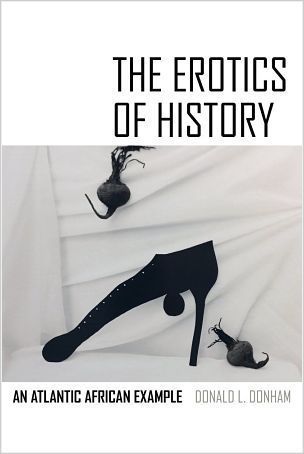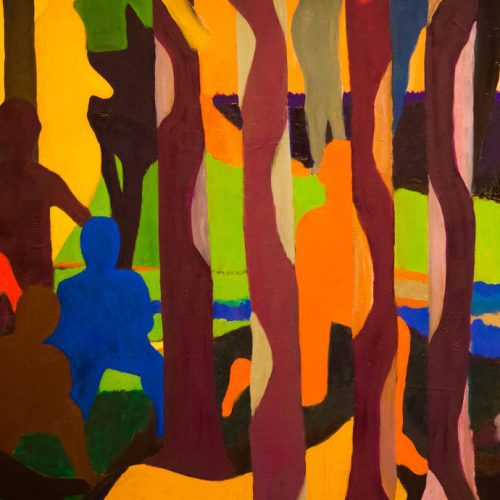Donald Donham’s The Erotics of History: An Atlantic African Example is not a traditional ethnography. The author first became aware of a provocative erotic practice through his white, gay neighbor in Oakland, California, whom Donham explains sold his house in order “to move to Africa and live with his married-to-a-woman boyfriend” that he met online (18). Donham visited this anonymous West African community multiple times in order to conduct fieldwork for one year on the hybridized culture of the region, exploring the economic, social and sexual history of its particular erotic practices. Donham explains that his motivation for understanding this community arose not from “the deepening of ethnographic detail,” but rather for “the construction of a theoretical approach that would make sense of such a provocative case” (26). The Erotics of History, therefore, is largely devoid of ethnographic details, instead seeking answers to a larger complex of questions concerning colonialism, slavery, technology, capitalism, and erotic identity (26).
This approach allows Donham to critique the universality of sexuality by focalizing one particular cultural erotic practice. Specifically, Donham analyses an erotic practice in which African men meet white, homosexual American and European men over the internet, and invite them to live in their community from anywhere from one month to a few years.
The white men typically act as benefactors for their African lovers, supporting them financially and purchasing gifts, homes, automobiles and alike for them during their stay. These relationships are grounded, argues Donham, in the historical fetishization of African men under the European colonial gaze, which tended (and still tends) to hypermasculinize African men.
By zeroing in on this particular erotic practice, The Erotics of History problematizes the stability of human sexuality en toto, and in so doing posits a radically non-essentialist, and even anti-historicist interpretation of human erotic practice.
 Commenting on how eroticism is shaped by the socio-economic conditions of colonialism and capitalism, The Erotics of History identifies how this particular male-male erotic practice came to be between European men and African men based on an “inversion of the actual historical pattern” of master/slave relations between the two continents. The hypermasculinized image of African men produced by colonial discourse and accompanied by a fantasy of reversing power relations “motivated by black revenge for past white oppression […] created a particular erotic experience for both Europeans and Africans,” writes Donham (7). For Donham, “the erotics of history” stands for “how particular erotic attachments of individuals are conditioned by wider historical and cultural patterns and memories” (7-8). By investigating the nuances of this particular erotic practice while keeping an ear to the ground of universality, Donham “situate[s] stories of sexual attraction — fetishes — within the wider contours and changes of postcolonial capitalism itself” (8). In essence, Donham seeks to prove “how the actual history of power can condition, through reversal and redefinition, the constitution of the erotic” (73).
Commenting on how eroticism is shaped by the socio-economic conditions of colonialism and capitalism, The Erotics of History identifies how this particular male-male erotic practice came to be between European men and African men based on an “inversion of the actual historical pattern” of master/slave relations between the two continents. The hypermasculinized image of African men produced by colonial discourse and accompanied by a fantasy of reversing power relations “motivated by black revenge for past white oppression […] created a particular erotic experience for both Europeans and Africans,” writes Donham (7). For Donham, “the erotics of history” stands for “how particular erotic attachments of individuals are conditioned by wider historical and cultural patterns and memories” (7-8). By investigating the nuances of this particular erotic practice while keeping an ear to the ground of universality, Donham “situate[s] stories of sexual attraction — fetishes — within the wider contours and changes of postcolonial capitalism itself” (8). In essence, Donham seeks to prove “how the actual history of power can condition, through reversal and redefinition, the constitution of the erotic” (73).
Donham elaborates a provocative account of fetishization and the erotic, arguing that “the very process of erotization may necessarily involve some ‘objectification’,” or, as he will go on to claim, fetishes function as “external controlling organs” on the body of the subject (15, 38).
For Donham, the fetish is the fundamental, material ground of all erotics, a point which is elaborated on in terms of both history and the political consequences thereof.
Chapters Two and Three offer a brief history of the concept of fetish from its African roots, through Hegel, Marx, Freud and Lacan, Foucault and up through Bruno Latour’s notion of the ‘factish.’ As Donham observes, from the standpoint of European rationalism, “the notion of the sexual fetish originated precisely in structural opposition to the tamed interests, and in doing so, it became the very epitome of the irrational” (13). One example of this opposition can be found in Hegel’s racism toward the African continent, posed as the idea of fetish as “what reason was not” (29), and therefore indicating the alleged rift between European reason and irrational African ‘primitivism.’ For Marx, explains Donham, the fetish transformed into the “misattribution of the power and creativity of human labor to mere things” (29). Although Freud’s conception echoed Marx’s insofar as “fetishism involved a displacement from ‘reality,’” Donham contends that, “the primal story he [Freud] told involved not the shape of world history but the contours of individual development” (29).
For Donham’s purposes in investigating the postmodern condition of the fetish, “fetishes can be cultivated as tastes can be ‘educated.’ They depend upon an infrastructure of mediation, social interaction, and historical context” (85). At their roots, fetishes are therefore enculturated, economized, and produced via social structures such as colonialism and capitalism.
From these theoretical coordinates, Donham tracks the ontology of the postmodern “contact zone” between cultures “with radically different definitions of the erotic, [and] roles to be taken in sex,” tracking the “underground libidinal networks” that form between them (19). In the case of African men engaged in “… male-male relationships with foreigners,” their relations began “to subsidize traditional marriage” between men and women, often in terms of financial support (25). Donham inverts the long-held notion that sexuality exists as a flexible set of cultural practices and object-choices, asserting on the contrary that “unstable, the erotic changes over time” (51).
Donham reads human sexuality as an obstacle rather than a solution, and is therefore more in line with the psychoanalytic tradition than the Foucaultian.
In fact, in a particularly striking passage — from Chapter Four “The Poverty of Sexuality,” the title of which echoes Marx’s “The Poverty of Philosophy” — Donham implicitly indicts Foucault, as he writes, “[t]he adjective, ‘sexual,’ continually modifies and therefore moves, but the noun, ‘sexuality,’ denotes a determinate state of being with distinct predicates” (48). This is therefore why Donham opts to study erotics rather than sexuality, critiquing followers of Foucault by writing, “it is altogether surprising to see his [Foucault’s] supposed followers pluralizing ‘sexuality’ into ‘sexualities’ — as an assumed progressive, more inclusive theoretical move” (48-49). This observation parallels Žižek’s psychoanalytic critique of the LGBTQ+ movement (or movements), on the “deadlock of classification” and the need for continuous pluralization and categorization of discrete sexualities (Žižek, 2016).

In Chapters Five and Six, Donham details the roles that both photography and the internet play in the contact zone between European and African men. Donham turns to Robert Mapplethorpe’s Man in Polyester Suit (1980) as an example of the way in which black masculinity was fetishistically produced by the photographic image, observing that, “before the pervasiveness of photographic images, the imprinting of fetishes upon social actors depended upon unmediated seeing… Afterword, the camera not only conveyed fetishes but also may have played a role in propagating them” (56). Donham outlines how both photography and the internet as collective media are capable of housing large quantities of educational data as well as connecting distant cultures together, generating a veritable “encyclopedia of erotic reference” (97). Indeed, as Donham observes, “many of the relationships between Africans and foreigners… had begun in Internet cafés,” mentioning how “one or two… were entirely devoted to young African men educating themselves about Western gay customs, all the way from the difference between tops and bottoms to sadomasochism and master/slave relationships” (22).
Not only does he provide successful critiques of colonialism and capitalism, but as well Donham demonstrates the intimate albeit fraught relationship between political economy, geography and erotics, tracing an ontology of the concept of fetish and the link between fetish-objects and eroticism in contemporary social relations between African and European men.
The Erotics of History is for anthropology what Alenka Zupančič’s What IS Sex? is for psychoanalysis; both successfully dismantle longstanding colloquial notions of sexuality and longstanding historicist/deconstructive theories of sexuality as well.
The correspondence between these two authors is palpable, as toward the end of the book, Donham asks a question that Zupančič herself seeks to unpack, namely “what makes sex sexy?” (84). For Zupančič, sexuality is an ontological category, and therefore “sexuality gets sexualized precisely in [the] interval that separates it from itself” (Zupančič , 2012). The ontological is as well at stake in Donham’s work, particularly in his take on the fetish, as he goes on to observe how all of the permutations of the concept of the fetish “problematize, in different ways, the assumed boundaries of persons and things, or persons and parts of persons treated like things,” ostensibly rethinking the boundaries of the human subject, problematizing sexuality as a fixed, universal of human life by identifying how the erotic is entangled in the socio-economics conditions of human life, and therefore the book functions as an extended rumination on object-relations as such (85).
As Donham puts it in the book’s preface, although he has spent his career “extolling the virtues of ethnography,” the present volume requires him necessarily to leave the ethnographic form behind; due to the persistence of homophobia in the Western coast of Africa, Donham’s subjects would face great danger if their identities or even regional specificities were to be made manifest (xiii).
The anonymity of the community Donham analyses ostensibly makes his study an ethnography sans ethnos, and in this way, a truly provocative account of sexuality, history, colonialism and capitalism, marking a unique achievement in postmodern anthropological studies. For these reasons, Donham’s book is recommended for readers interested in investigating the intersections of anthropology, psychoanalysis and philosophy, as well as those interested in the burgeoning field of object-oriented or speculative realist thinking.
The work as well can be read as a ‘meta’/‘para’- ethnography, which not only provides a crucial commentary on the ethnographic form itself, but also demonstrates the utility of postmodern anthropological studies toward understanding how the particular is situated within the universal, and furthermore how the universal is always mediated by the particular in a perpetual dialectical engagement. For these reasons, Donham’s book reaches well beyond the subject line that graces its back cover; although the work is most certainly an important contribution to anthropology, The Erotics of History, just as erotics themselves, offers an excess which cannot easily be contained by one designation alone, and therefore informs theoretical practice from a multitude of disciplinary fronts at once. An open access version of The Erotics of History is available for download from www.luminosoa.org.
Works Cited
Žižek, Slavoj. “The Sexual Is Political.” The Philosophical Salon, Los Angeles Review of Books, 1 Aug. 2016.
Zupančič, Alenka. “Sexual Difference and Ontology.” E-Flux #32, February 2012.
Zupančič, Alenka. What IS Sex? MIT Press, 2017.
Donham, Donald. The Erotics of History: An Atlantic African Example. Oakland: University of California Press. 152 pp. 2017. ISBN: 9780520296312.
Featured image (cropped) by Thomas Hawk (flickr, CC BY-NC 2.0)



